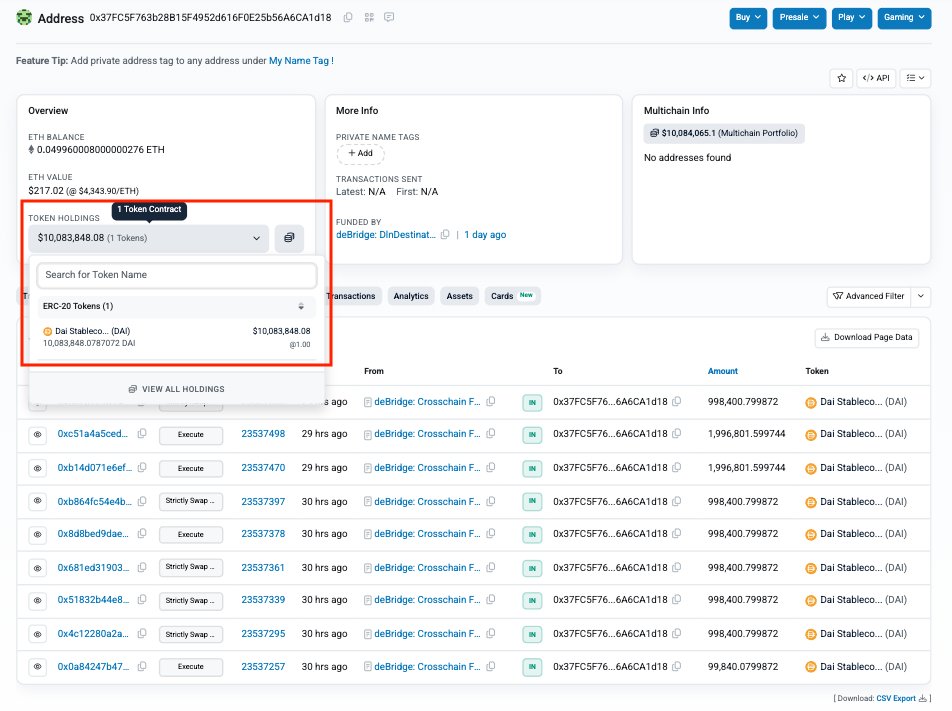
Hyperliquid wallet suffers major exploit as hacker drains over $21 million in crypto assets.
PeckShieldAlert reports precise private key breach leading to theft of DAI and SYRUPUSDP.
Hacker swiftly bridges stolen funds across multiple chains, complicating tracking and recovery efforts significantly.
In another shocking on-chain exploit, blockchain security firm PeckShieldAlert has revealed that an address linked to the Hyperliquid platform suffered a massive loss of around $21 million in crypto assets.
The incident reportedly occurred after the attacker managed to compromise the wallet’s private key, allowing full access to the victim’s fund
Hyperliquid’s Victim wallet Lost $21 Million
According to PeckShield’s on-chain data the hacker transferred 17.5 million DAI and 3.11 million SYRUPUSDP from the victim’s wallet. Soon after stealing the money, the hacker quickly bridged the assets across chains, making it harder to trace them.
However, the parts of the funds are now sitting in different Ethereum wallets, and investigators believe they may soon be swapped or laundered further.
PeckShield also shared a screenshots which show several wallet addresses connected to the incident, each reflecting traces of the stolen tokens being transferred, swapped, and distributed, a pattern commonly seen in laundering attempts after major crypto heists

- Also Read :
- WazirX Hack Update: CoinSwitch Secures ₹62 Crore Stolen Crypto After Bombay High Court Verdict
- ,
How the Hacker Got In
What stands out about this hack is the precision of the attack. Unlike smart contract bugs or exchange exploits, this attack happened because of a private key leak. That means the attacker got direct access to the wallet’s login credentials. Such leaks often occur due to phishing links, malware, or unsafe key storage.
Security experts have long warned that high-value accounts should always use cold wallets or multi-signature protection to prevent such incidents.
As investigations continue, PeckShield has urged all traders and project teams to stay alert, avoid clicking on suspicious links, and store private keys offline.
Never Miss a Beat in the Crypto World!
Stay ahead with breaking news, expert analysis, and real-time updates on the latest trends in Bitcoin, altcoins, DeFi, NFTs, and more.
FAQs
A wallet linked to Hyperliquid lost $21 million in crypto due to a compromised private key, not a flaw in the platform’s smart contracts or code.
Always use a hardware wallet for large sums, enable multi-signature security, and never share your seed phrase or click on suspicious links.
The largest risks are user-error related: private key leaks, phishing scams, and insecure hot wallet storage, rather than protocol-level failures.
Trust with CoinPedia:
CoinPedia has been delivering accurate and timely cryptocurrency and blockchain updates since 2017. All content is created by our expert panel of analysts and journalists, following strict Editorial Guidelines based on E-E-A-T (Experience, Expertise, Authoritativeness, Trustworthiness). Every article is fact-checked against reputable sources to ensure accuracy, transparency, and reliability. Our review policy guarantees unbiased evaluations when recommending exchanges, platforms, or tools. We strive to provide timely updates about everything crypto & blockchain, right from startups to industry majors.
Investment Disclaimer:
All opinions and insights shared represent the author's own views on current market conditions. Please do your own research before making investment decisions. Neither the writer nor the publication assumes responsibility for your financial choices.
Sponsored and Advertisements:
Sponsored content and affiliate links may appear on our site. Advertisements are marked clearly, and our editorial content remains entirely independent from our ad partners.








